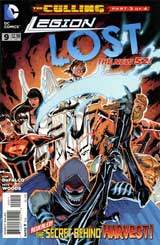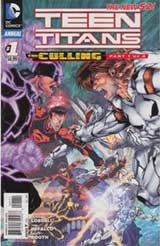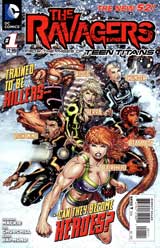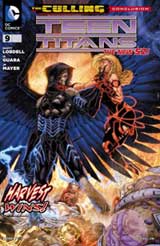- Comics
- Comics Reviews
- Manga
- Comics Reviews
- European Comics
- News
- Comics News
- Press Releases
- Columns
- Spotlight
- Digital Comics
- Webcomics
- Cult Favorite
- Back Issues
- Webcomics
- Movies
- Toys
- Store
- More
- About
By Philip Schweier
July 17, 2012 - 05:59
The
Culling is a seven-part story that begins with three preludes published in Legion
Lost #8, Superboy #8 and Teen Titans #8. Of these three
titles, Legion Lost is the only one I read regularly, so I am only
able to speculate as to events in those two preludes.

Legion
Lost features seven member of the Legion of Super-Heroes – Timber
Wolf, Wildfire, Tyroc, Dawnstar, Tellus, Gates and Chameleon Girl – sent
back in time from the 31st century on a mission from which there is seemingly
no return. Trapped in present day, they are attacked and captured by the
Ravagers, a team of young metahumans in the service of the super-villain
Harvest.
In his Antarctic stronghold, Harvest conducts the Culling, a gladiator-style
competition among young metahumans designed to elevate the strongest and most
powerful into his personal army, supposedly to save the future in some warped
fashion.
The three opening preludes – I can only guess that Teen
Titans and Superboy also chronicle their
respective capture by the forces of Harvest – dovetail into Teen
Titans Annual #1, which begins with the inaugural encounter
among Superboy and members of the Titans and Legion. And in the traditional
manner of all super-hero team-ups, the first thing they do is fight one another
until faced with a greater threat.

The four-part storyline then crossed into Superboy #9, as the Boy of Steel
goes toe-to-toe with Warblade, Harvest’s favored Ravager. Meanwhile the
idealistic Red Robin of the Teen Titans leads the others in a fight for freedom
until the arrival of hisownself, Harvest. The battle continues in Legion
Lost #9, where the cryptic master villain drops clues suggesting
that he was instrumental in the Legionnaires being brought to the
past in the first place, and that he has first-hand knowledge of some of their
secrets, as well as a possible means home for them. The story is concluded in Teen
Titans #9, as Titans, Legionnaires and Ravagers alike
(raising the
curtain for Ravagers #1) make their escapes from
Harvest’s complex.

By not over-emphasizing the more dramatic moments, such as death, revelations
and redemption, the story can at first seem to be little more than a
four-chapter fight scene. Perhaps in the hands of lesser writers, that’s all it
would be. But industry veterans Scott Lobdell and Tom DeFalco have
crafted a seamless escalation from capture to defiance to hostile conflict to
eventual escape, packed with action, even it does fall back on the
aforementioned team-up cliché of having the two group battle each other before
taking on the bigger threat. But even that is handled in such a way it seems
natural and justified.
The four chapters are collectively penciled by Brett Booth, R.B.
Silva, Pete Woods and I.G. Guara. Inkers include Norm Rapmund, Sal Regla, Marlo
Alquiza, John Livesay, Bob Lean, Iban Coello and J.P. Mayer. With so many
artists involved in the principle story, one might expect an inevitable amount
of inconsistency in the art, but that is not the case. Read at one
sitting, the artwork flows nicely, reflecting the spirit of teamwork that books
like the Titans and Legion should demand.

Some might feel The Culling to be derivitive of The Hunger Games.
I’m not in a position to judge, not being familiar with the movie, or the book
upon which it is based. But The Culling is a strong chapter that I’m
sure will be pivotal for both teams of young heroes – and the Ravagers.